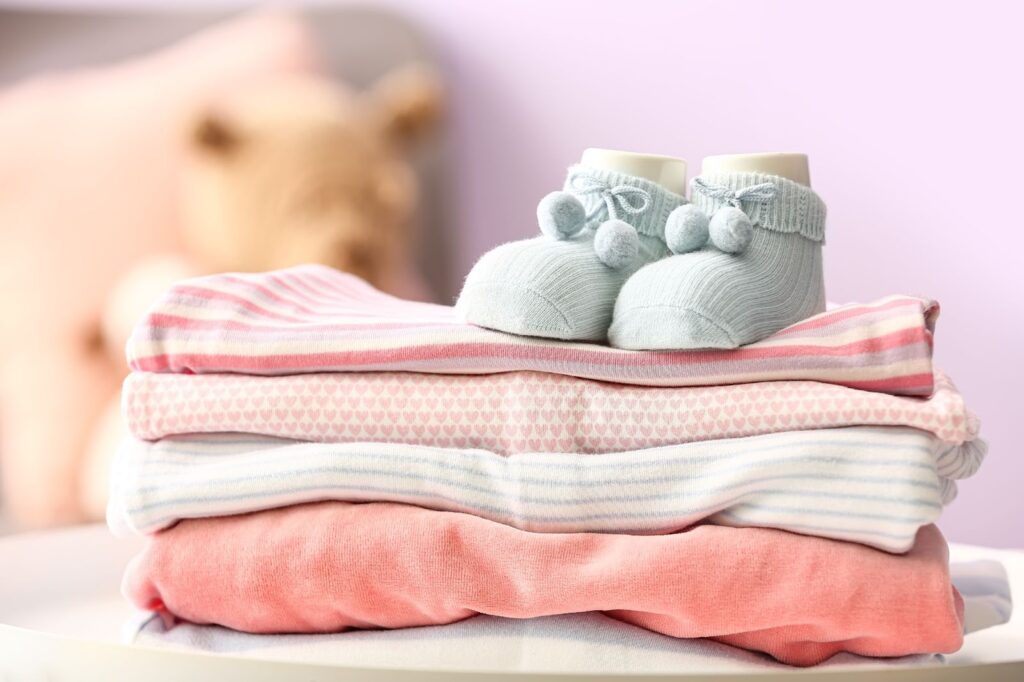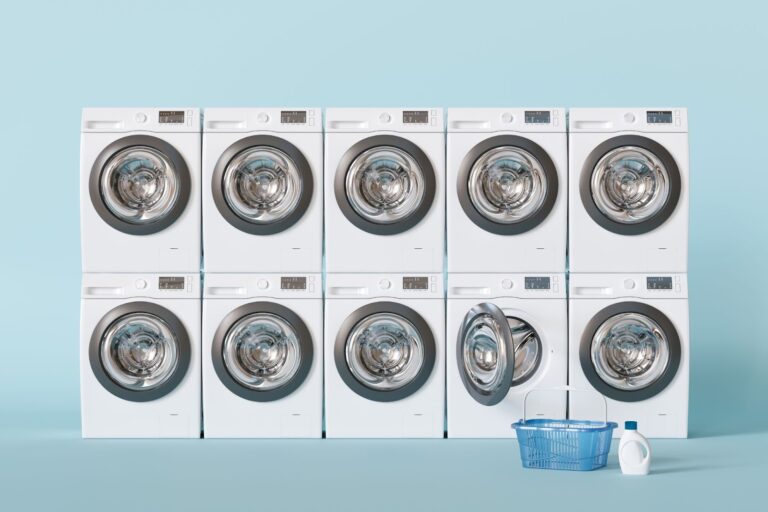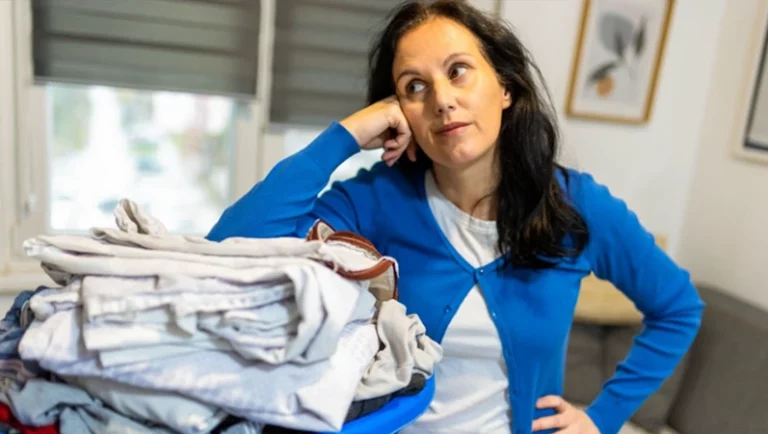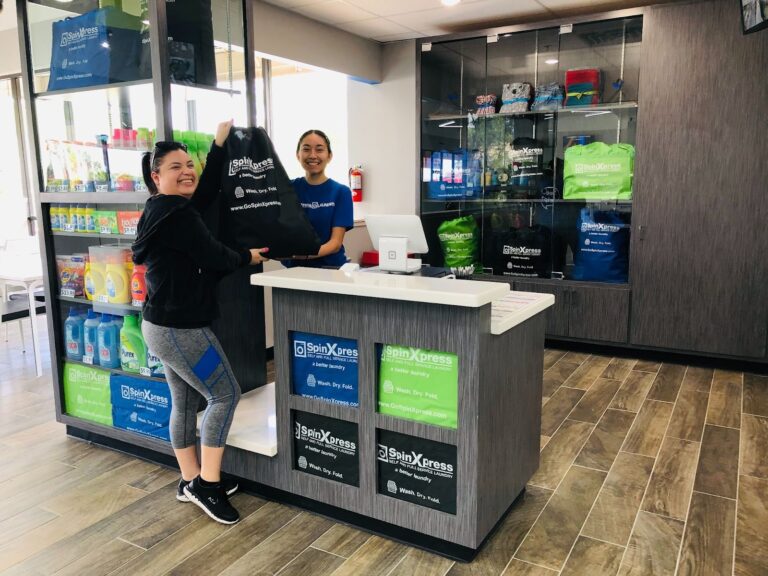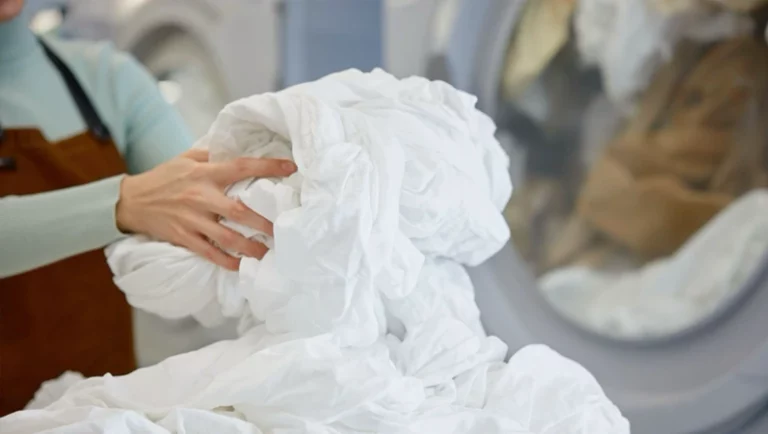Washing newborn clothes requires special care to ensure your baby’s delicate skin is protected.
From soft fabrics to gentle detergents, understanding how to properly handle baby garments can help prevent skin irritation, allergies, and damage to the clothing itself.
With your baby’s comfort and health in mind, it’s essential to follow certain guidelines when cleaning their tiny outfits.
In this guide, we’ll cover the best practices on how to wash baby clothes, from selecting baby-friendly laundry products to mastering the right washing techniques.
Why Is Pre-Washing Newborn Clothes Important?
Pre-washing newborn clothes is essential to ensure they are free from irritants that can harm your baby’s sensitive skin. Even brand-new garments can carry chemicals or dust from manufacturing and packaging.
- Removes Chemicals and Allergens: New clothes may contain dyes, fabric softeners, and other chemicals that can irritate your baby’s skin. Pre-washing helps eliminate these harmful substances before contact with your baby.
- Gets Rid of Dust and Dirt: Clothes can collect dust, dirt, or other particles during transport or while on store shelves. Washing them beforehand ensures that your baby only wears clean and fresh clothing.
- Softens the Fabric: Pre-washing can help soften stiff or rough fabrics, making them gentler on your baby’s delicate skin. This extra step ensures a more comfortable experience for your little one.
How Often Should You Wash Newborn Clothes?
Washing baby clothes should be done frequently, but how often depends on your baby’s needs and activity level. It’s best to wash soiled clothes immediately to prevent stains and bacteria buildup, especially after feeding, diaper changes, or any accidents.
General wear, such as onesies or sleepwear, can be washed after 1-2 wears to ensure freshness while keeping their wardrobe free from irritants. Regular laundering keeps your baby’s clothes clean, soft, and safe for everyday use.
What Are the Best Practices for Washing Newborn Clothes for the First Time?
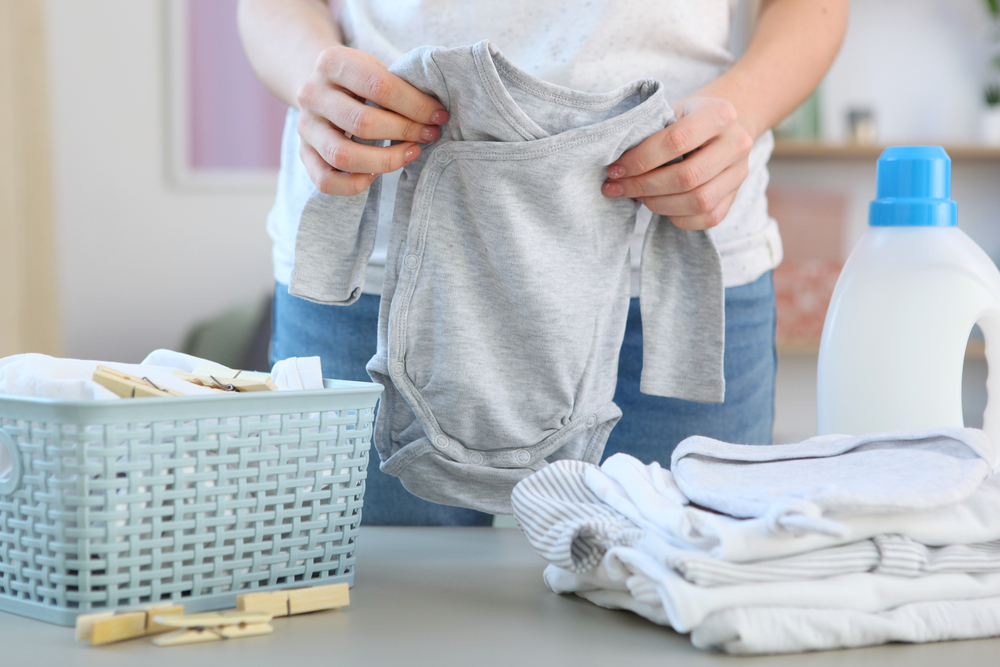
When washing newborn clothes for the first time, it’s important to follow a few essential steps to protect your baby’s sensitive skin. These practices ensure that the garments are clean, soft, and free of harmful substances.
- Use Baby-Safe Detergents: Choose a detergent specifically formulated for babies, as it is free of dyes, perfumes, and harsh chemicals. This will prevent any skin irritation or allergic reactions.
- Wash in Cold or Warm Water: Use cold or warm water for the wash cycle to avoid shrinking or damaging delicate fabrics. Hot water can be too harsh on baby clothes and unnecessary for removing dirt or stains.
- Avoid Fabric Softeners: Skip fabric softeners, as they can leave a residue that may irritate a newborn’s sensitive skin. Instead, air-dry or use a gentle dryer setting to keep clothes soft and comfortable.
How Should You Handle Different Fabric Types, Such as Wool Baby Clothes?
Different fabric types require special care when washing to maintain their quality and comfort. Wool, cotton, and other delicate materials should be handled appropriately to avoid damage.
- Wool: Hand wash or use a wool-safe detergent in the washing machine on a delicate cycle. Wool is prone to shrinking, so air-dry flat to maintain its shape and softness.
- Cotton: Cotton baby clothes are durable but can shrink if exposed to high heat. Wash in cold water and tumble dry on low heat to preserve the fabric’s texture and size.
- Silk or Satin: For special occasions, outfits made from delicate fabrics like silk should be considered for hand-washing or using a delicate machine cycle. Avoid wringing or twisting, and lay flat to dry to prevent stretching.
What Steps Should You Follow to Wash Baby Clothes in the Washing Machine?
Washing baby clothes in the washing machine requires extra attention to ensure they stay soft and irritant-free. Following these steps will help keep your baby’s clothes clean and safe.
- Sort Clothes by Fabric and Color: Separate baby clothes by fabric type and color to prevent color bleeding and fabric damage. This also ensures that delicate garments are washed gently.
- Use a Gentle Cycle: Opt for the machine’s gentle or delicate cycle to prevent wear and tear on baby garments. This helps preserve the softness and quality of fabrics like cotton and wool.
- Choose Baby-Safe Detergents: Always use the best baby detergent that is free of harsh chemicals, perfumes, and dyes. These types of detergents are specifically formulated to be gentle on a baby’s sensitive skin.
- Avoid Bleach and Fabric Softeners: Skip bleach and fabric softeners, as they can cause irritation and degrade fabric over time. Instead, pre-treat any stains with baby-safe stain removers.
- Dry Gently: Use the dryer’s lowest heat setting or air-dry to keep baby clothes from shrinking or becoming rough. Over-drying can make fabrics stiff, so take them out while slightly damp if possible.
How to Hand Wash Baby Clothes?
Hand-washing baby clothes is a gentle way to clean delicate fabrics and ensure they remain soft and irritation-free. Start by filling a basin with lukewarm water and adding a baby-safe detergent.
Gently submerge the clothes, swishing them around to lift any dirt or stains. Lightly scrub soiled areas with your hands, then rinse thoroughly under cool water to remove all soap residue. Finally, press the clothes between two towels to remove excess water, and lay them flat or hang them to dry.
What Are the Safety Tips for Washing Newborn Clothes?
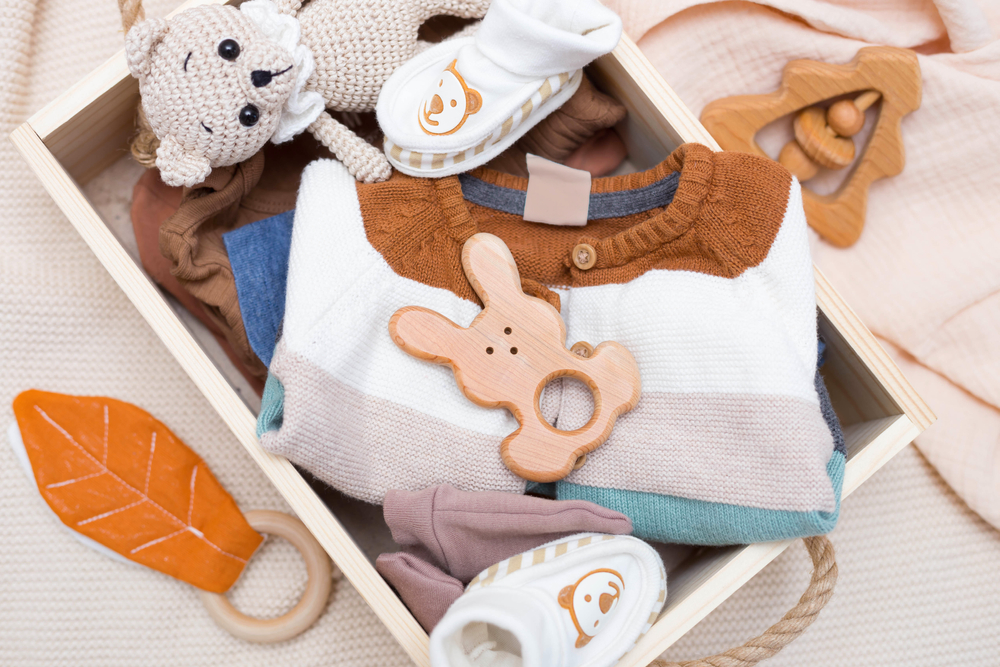
When washing newborn clothes, it’s crucial to prioritize safety to protect your baby’s delicate skin. Following these tips will help ensure clean and irritant-free garments.
- Wash New Clothes Before Use: Always wash new baby clothes before the first wear to remove potential allergens, chemicals, or dust that can irritate sensitive skin.
- Use Baby-Specific Detergents: Choose hypoallergenic, baby-safe detergents that are free of fragrances and dyes. This minimizes the risk of allergic reactions or skin irritations.
- Rinse Clothes Thoroughly: Ensure all soap and detergent are fully rinsed out of baby clothes to prevent residue buildup. Leftover detergent can cause skin irritation or rashes.
How to Treat Stains on Baby Clothes Before Washing?
Stains on baby clothes are common, but treating them properly before washing can help keep garments fresh and clean. Here are a few tips on how to effectively wash newborn clothes and pre-treat stains.
- Use a Baby-Safe Stain Remover: Apply a baby-friendly stain remover to the affected area before washing. These products are gentle and designed to be safe for delicate fabrics.
- Soak in Cold Water: For tough stains like formula or spit-up, soak the stained clothes in cold water for 15-30 minutes before washing. This helps loosen the stain without setting it in.
- Gently Scrub the Stain: Use a soft brush or your fingers to gently scrub the stained area. Avoid harsh scrubbing, as it can damage the fabric, especially on delicate items.
Can You Use Fabric Softeners on Newborn Clothes?
Fabric softener for newborns is generally not recommended due to the potential for skin irritation. Many fabric softeners contain chemicals and fragrances that can leave residue on the fabric, which may irritate a baby’s sensitive skin.
Additionally, softeners can reduce the absorbency of fabrics, particularly in items like bibs or towels, making them less effective. Instead of using fabric softeners, opt for natural methods like air-drying to keep baby clothes soft and gentle.
What Precautions Should You Take When Using Bleach on Baby Clothes?
Using bleach on baby clothes should be done with caution, as it can be harsh on both fabric and skin. If you must use bleach, follow these safety tips to protect your baby’s health and clothing.
- Use Only Non-Chlorine Bleach: Opt for non-chlorine or oxygen-based bleach, as it is gentler and less likely to cause skin irritation. Always check the label to ensure it’s safe for baby clothes.
- Dilute the Bleach: Always dilute bleach properly before using it on baby clothes to avoid fabric damage or discoloration. Never apply bleach directly to clothing.
- Rinse Thoroughly: After using bleach, make sure to rinse the clothes multiple times to remove any remaining bleach residue. Leftover chemicals can cause rashes or allergic reactions.
What Are the Best Detergents for Sensitive Baby Skin?
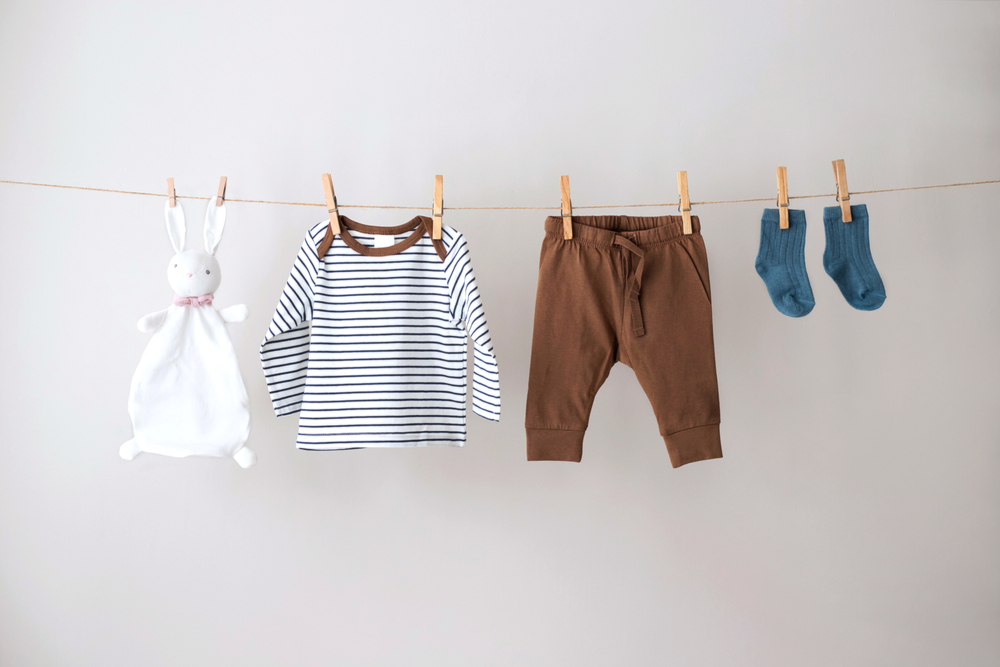
When choosing a detergent for your baby’s clothes, it’s essential to pick one that is formulated for sensitive skin. Look for detergents that are free from harsh chemicals, fragrances, and dyes. These features help reduce the risk of irritation, rashes, or allergic reactions.
A gentle detergent that cleans effectively without leaving any residue will ensure your baby’s clothes remain soft and safe for their delicate skin.
How to Dry and Store Baby Clothes Properly?
Properly drying and storing baby clothes is essential to maintain their softness and prevent any potential irritants. Follow these tips to ensure your baby’s clothes stay clean and fresh.
- Air-Dry When Possible: Air-drying is gentler on baby clothes and helps maintain their softness. It also prevents shrinking and reduces wear and tear from high heat in the dryer.
- Use Low Heat in the Dryer: If you must use a dryer, opt for the lowest heat setting to protect delicate fabrics. Remove clothes while still slightly damp to avoid over-drying.
- Store in a Clean, Dry Place: Store baby clothes in a clean, dry area, preferably in breathable fabric bags or lined drawers. This helps prevent dust buildup and keeps the clothes fresh and ready for use.
When Should You Consider Professional Cleaning for Baby Clothes?
Professional cleaning may be necessary for delicate baby garments like wool or silk, which require special care. If a garment has stubborn stains or is made of fabric that cannot be easily cleaned at home, professional cleaning can preserve its quality.
Additionally, professional services for newborn laundry are helpful for heirloom baby clothes or keepsake items you want to pass down. Always inform the cleaner that the clothes are for a baby, so they use gentle, baby-safe products.
Simplify Baby Clothing Care with SpinXpress Laundry Services in Houston, TX
Caring for your newborn’s clothes requires attention to detail, from choosing the right detergent to following proper washing techniques.
With delicate skin in mind, taking extra steps like pre-washing, stain treatment, and fabric-specific care ensures your baby’s garments are safe and comfortable. However, when laundry becomes overwhelming, especially with a newborn in the house, consider professional help from laundry services in Houston.
SpinXpress Laundry in Houston, TX, offers convenient laundry services designed to handle your baby’s clothes with care. Whether it’s routine washing or treating stubborn stains, SpinXpress Laundry makes baby laundry hassle-free, so you can focus on what matters most—your baby. Contact us today for your newborn laundry services needs!

